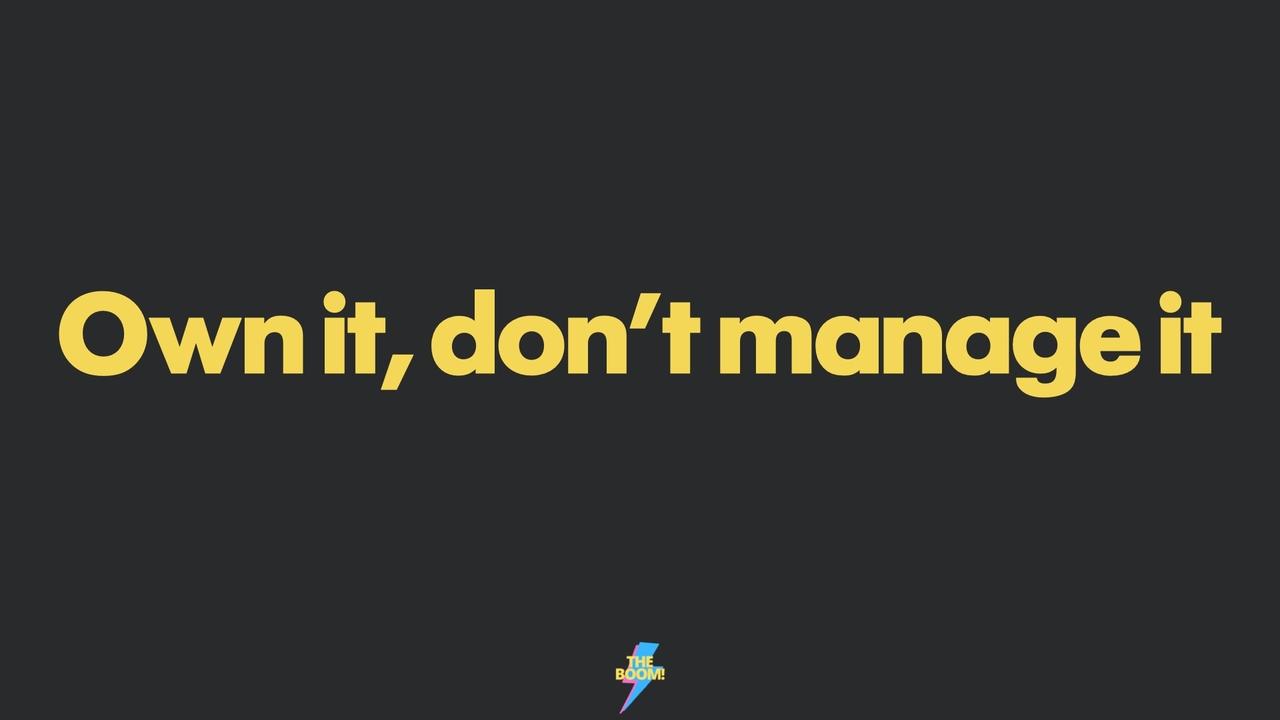Own it, don't manage it
May 04, 2020
Busyness is the new stupid
So I’ve been told.
Makes sense. We’re an attention starved, hyper-sensitive, eager to please organism. We have screens, open door policies, meetings, expenses and a whole heap of distractions that zap time like the Hadron Collider.
And, in my role of exec coach to some of the most fantastic leaders, the big pain point that repeats like a seafood taco is ‘lack of time’
Lack of time to do all the things I need to do, lack of time to think deeply, lack of time to focus on my wider life.
Lack of time is an epidemic. But, as hard as it may seem, it’s also a choice.
In reframing conversations with people about this I explain that firstly, and painfully, this is a choice we make. Of course, none of us would like to admit that it’s a choice. No one wants to admit to doing ‘busyness’ over ‘business’. No-one wants to admit that the fact they missed a recital or failed to deliver the company’s plan is because they chose to.
Wrong choice, bad choice but choose you did.
Now, I’m as guilty as anyone for doing this. I used to revel in being busy, to not having time for certain things, particular people or specific challenges. It was a badge of honour, the first port of call in an opening conversational gambit, a precious crutch to convince myself I was doing things of worth.
But it was bullshit.
And only when I unblocked my old thinking that it wasn’t a choice did I start to unlock a new way of reframing my time.
“You could leave life right now. Let that determine what you do and think”
Marcus Aurelius
Time is our most valuable asset. Yet we eat through it like Cookie Monster on a bag of Marylands...spilling bits all over the place, never feeling satisfied and craving for more. Eternally seeking the next bag of cookies.
And we talk about ‘time management’ like some kind of superheroic saviour of a tool that cocoons us safely in a cloak of optimization. Yet it’s flawed.
Here’s an exercise.
Take out your calendar/diary and write down how many people ‘manage’ your time. From your PA to your team to your friends to your family.
You’ll probably find you have a comprehensive list of people who manage your time. FOR you.
Then we squeeze everything else into what’s left - ‘me’ time, ‘thinking’ time and other buckets we promise ourselves. And we wonder why we’re stressed, overwhelmed or at the very worse burned out. In other words, the misnomer of time management is that we are left to manage the scraps and bones, not the meat.
Look back at the quote above from Marcus Aurelius. If you were to make the choice, a deliberate and determined choice, to do something different, to own your time like the sands were about to end, how willing would you be to unlock a new way forward?
Welcome to Time Ownership. A subtle but powerful reframing that when unleashed will change your relationship with this precious asset.
Time ownership is a conscious choice to put your needs first and prioritise what is most important for you to deliver at any given moment. You’re in control. You OWN the time, no-one else. And everything else fits around it.
Step 1: Lock it in
To start, work out when you are at your best, your most productive. Think about what you need, the tools, the environment, the amount of time. Plot that into your schedule. If you need 2 hours every day in a quiet space to have deep thinking time, lock it in. If you need to be home by 5.30-6.30 to read the kids a story and put them to bed, lock it in. If you are a night owl and prefer to spend 1 hour between 1 and 2 to do your best work, lock it in.
Do this with all things you need to be at your best, physically, mentally, spiritually and emotionally. Now lock them in.
You are now actively practicing time ownership.
Step 2: State intent
You know when you want to buy a new car, say, a red Mini and all you see on the road for the next 2 weeks are red Minis? That’s the power of intent.
When you actively state what you want to see happen, the world aligns around it.
So, once you’re armed with your new Time Ownership schedule, you need to let everyone know your intent to follow it. Your reason and rationale? This is how everyone is going to get the best version of me in their lives. Therefore, at certain times, this is how I want to work and live.
The world will align.
Step 3: Learn to say No
Of course, like with any new behaviour, there will be blockers and traps the size of a cream cake on the off day of a 5:2 diet.
Your job here is to follow through with your actions. Be flexible to negotiate a little if you need to but trade off. If your time isn’t being used to best effect, your performance will not be at its best - let people know that if you’re trading off.
Also, use Time Ownership as a filter to do more of the things you’re great at and less of the things you’re not. Focus your time where you’ll add value and say no where you won’t.
Unleashing this new approach has changed the way many of my coachees work. It’s refocused their value back to the business and indeed their lives. It’s powerful, proactive and performance enhancing.
So what choices are you making with your time?
Stay Boom!

